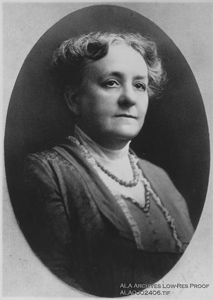 To continue our blog series highlighting pioneering women librarians, this next post will focus on Mary Wright Plummer (1856-1916). A member of Melvil Dewey’s first class in librarianship at Columbia College, Plummer went on to establish an impressive career in librarian education, children’s librarianship, and international librarianship, and served as the ALA’s 2nd female president from 1915-1916.
To continue our blog series highlighting pioneering women librarians, this next post will focus on Mary Wright Plummer (1856-1916). A member of Melvil Dewey’s first class in librarianship at Columbia College, Plummer went on to establish an impressive career in librarian education, children’s librarianship, and international librarianship, and served as the ALA’s 2nd female president from 1915-1916.
Born to a Quaker family, Plummer attended Wellesley College from 1881-1882, studying languages and creative writing. Her librarianship career began when she enrolled at the age of 30 in “the first class in library science on the planet”[1], Melvil Dewey’s 1887 class in the School of Library Economy at Columbia College. Distinguishing herself immediately in her studies, she was selected to present her experience in library school at the American Library Association’s 1887 meeting (“The Columbia College School of Library Economy from a Student’s Standpoint,” printed in Library Journal, September-December 1887).
In her senior year, she taught a beginning cataloging course for juniors. After graduation, she worked for a year as a cataloger at the Saint Louis Public Library before joining the Pratt Institute in 1890 as assistant library director and organizing a class in librarianship, effectively launching the second library school in the country. As the Pratt Institute Free Library’s director from 1895-1904, she developed an art reference library and designed the first separate children’s room in the country. The children’s room was the first to have medically designed tables and chairs, and Plummer is attributed with the idea that children’s librarianship should have specialized training. She curated the Pratt Institute Educational Exhibit at the 1893 Columbian Exposition in Chicago.[2]
She was president of the New York Library Club (1896-1897 and 1913-1914), president of the New York State Library Association (1906) and chairman of the Committee on Library Training in the ALA (1903-1910), during which the committee established the standards for library training. In 1900, she was the US delegate to the International Library Congress in Paris and in charge of the ALA exhibit at the Paris Exposition later that year, where she presented on the American practices of library service for children.[3]
The international visibility and promotion of her projects drew educators from all over the world to the Pratt Institute. She directed the Pratt library school until 1911, when she helped start a library training program at the New York Public Library, which she directed until her death in 1916. Five years before women were allowed to vote in the US, Plummer was elected President of the American Library Association in 1915-1916, the second woman to serve as ALA President after Theresa West Elmendorf. She had served previously as second vice president in 1899-1900 and 1911-12.[4]
Serving as ALA President and already ill from cancer, her address at the 1916 Ashbury Park Conference, delivered in absentia, was a powerful statement for democracy and intellectual freedom:
What has all this to do with LIBRARIES? This: that free-will to choose must be based upon a knowledge of good and evil; access to all the factors for making choices must be free to the people of a democracy which can flourish and develop and improve only as it continues to make wise choices. The FREE LIBRARY is one of the few places where education and wisdom can be obtained for preparation in the making of choices.” (Italics in original) […] Where truths are being debated, no matter how strenuously, the people know that the library will give them both sides, that they may have all the material for a decision.[5]
She was eulogized after her death by Princeton librarian E. C. Richardson that no other individual except for Librarian of Congress Herbert Putnam had “contributed so much constructively to the general elevation and dignity of the library profession in America as Miss Plummer.”[6]
Her personal papers are divided amongst the American Library Association Archives, the Pratt Institute Archives, and the New York Public Library Archives.
For more information:
[1] Quoted from Maack, Mary Niles. “‘No Philosophy Carries So Much Conviction As The Personal Life’: Mary Wright Plummer As An Independent Woman.” Library Quarterly 70.1 (2000) from Plummer, Mary Wright. “The Free Library in Education.” Paper presented at Brooklyn Woman’s Club, Brooklyn, N.Y., winter, 1891. Columbia University, New York Public Library School (CU-NYPLS), Mary Wright Plummer Papers, box 6.
[2] Bohdan S. Wynar, ed. Dictionary of American Library Biography. Littleton, CO: Libraries Unlimited, Inc., 1978. 399.
[5] Plummer, Mary Wright. “President’s Address: The Public Library And The Pursuit Of Truth.” Papers and Proceedings of the Thirty-Eighth Annual Meeting of the American Library Association, (Chicago, 1916), pg. 111. Record Series 5/1/2, American Library Association Archives, University of Illinois at Urbana-Champaign.
[6] Richardson, E. C. “In Defense of Standards.” Meeting in Memory of Mary Wright Plummer. New York Library Club. 1916.